Keyword Clustering Tool
Keyword clustering involves grouping keywords that are similar to each other together. Essentially a “keyword cluster” is a group of keywords that mean the same topically and can be targeted together on a single page.
Upload your keyword list into Keyword Insights, and we’ll analyse the search engine result pages to group any keywords together where the ranking URLs are the same or similar.
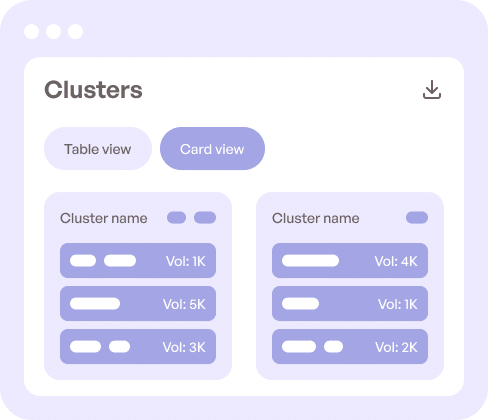
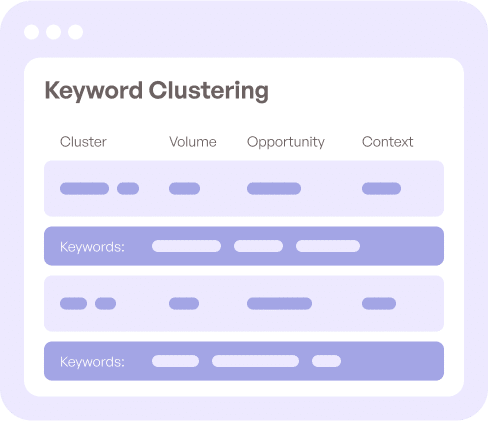
Optimise for more than one keyword. Get better results.
It’s much easier (and organically rewarding) to create content that can rank for many low-volume, low-difficulty keywords than creating a piece targeting a single high-volume keyword.
Cluster your keywords and aim to rank for groups of keywords.
Learn more about keyword clustering in our detailed guide here.
Take the guesswork out of content production.
When creating new content, knowing when a particular piece should be broken out into more specific sub-topics can be challenging. For example, if we had the keywords "architect fees" and "how much do architects cost?" would you quickly know whether you need 2 different pages to target these or if they could be targeted on the same blog?
Keyword Insights makes this quick and painless. We use live search results pages and group keywords based on what's ranking. So you’ll know, in seconds, when a page should be broken out into sub-topics to stand the best chance of ranking.
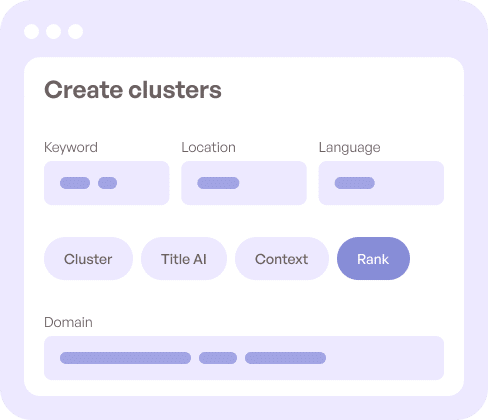

Find gaps in your content quickly. Like, really quick.
With the flick of a switch, we allow you to pull in your current rank and the ranking URL for each cluster.
This will allow you to spot gaps in your content very quickly... It's just a case of looking for the clusters that don't rank (or rank poorly).
We cluster better. We really do.
We understand every niche is different, so we give you maximum flexibility with your keyword clustering settings. You can adjust the URL overlap (default is 30%), the type of clustering algorithm used and how strict the NLP is to form your topical cluster recommendations.
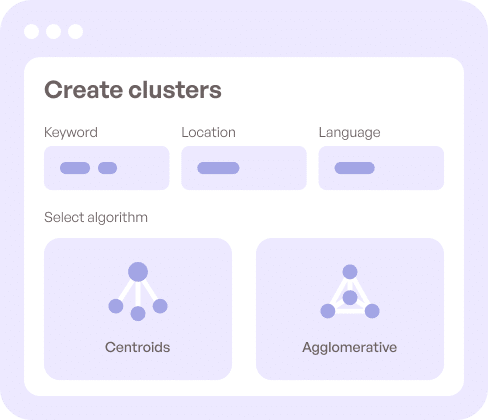
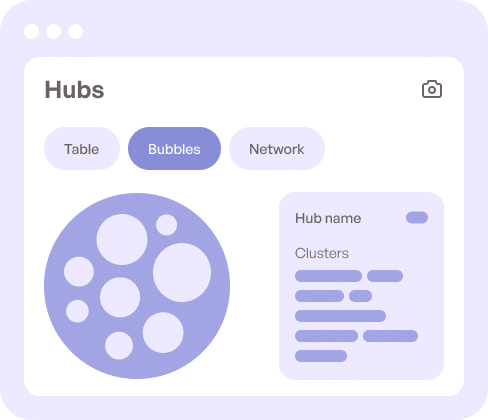
We make topical modelling simple.
Once you have your keyword clusters, it may be helpful to know how closely related those clusters are to other clusters. We apply NLP to find the semantic relationship between the clusters.
This allows you to view how similar specific clusters are to one another so that you can easily plan and create a content calendar around a given "topic".
The topical cluster insight is part of the “clustering” insight, so you won’t need to select this as an additional option.
Actionable Insights through Cluster Analysis with Our Algorithm
We understand that analyzing cluster outputs can be a laborious task. That's why we created an in-house algorithm that carefully analyzes your output clusters, selects the best keyword from each cluster, and even highlights it for content briefing and writing.
Our algorithm takes into account search volume and uses a machine learning model to determine the keyword that generates the most articles in Google SERPs. With just a click of a button, you can send the cluster for brief creation, saving you time and effort.
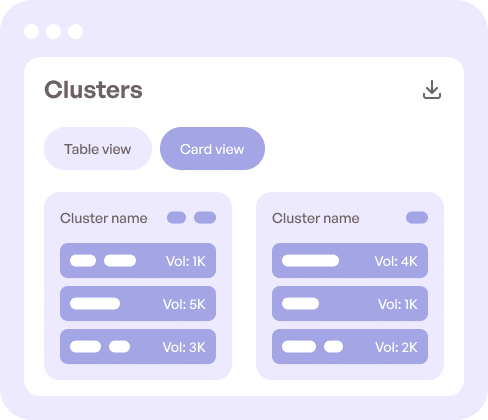
We operate in Google’s world
Unlike some clustering tools which attempt to use Natural Language Processing to group keywords together, we analyse Google search results and group them based on what's ranking. It means we're more accurate.
Please note: We use NLP to "cluster the clusters" together, as detailed in the section above, but not to cluster the keywords together.
Explore our workflow

Discover
keywords

Cluster
keywords

Create
brief

Create
Article
Great content writing starts with excellent planning, and planning can be tedious. Our AI-driven content brief generator is designed to help you outline the perfect article quickly, effortlessly and at scale.

“Keyword insights has quickly become an essential part of our agency's tool stack. The clustering, intent classification and briefing features help us supercharge our SEO and content team's productivity levels, allowing them to spend more time delivering valuable insights for our clients.”
William Nye
Technical Director at Builtvisible
KWI Clustering vs other tools

- Price
- Clustering algorithms
- Locations and languages
- Number of clusters per month
- URL overlap
- Custom keyword upload
- Keyword upload limitation
- Topic cluster model
- Cluster visualization
- Cluster rank tracking
- Cluster search intent mapping
- Pivoted CSV output
- Content creation workflow
- Subscription or Pay as you go
- $58 per month
- Centroids & Agglomerative
- Yes
- Unlimited
- 10 URLs, ability to change
- Yes
- 200,000 keywords at a time
- Bubble / circular packing
- Card and table view
- Yes
- Yes
- Yes
- Advanced
- Both
- Both
Frequently asked questions
We have put together some commonly asked questions.
Start your 4-day trial for just $1!
Sign up today for a $1 trial and enjoy access to 6000 keyword clustering credits, 40 keyword discovery searches, 1 Content Brief and Pro versions of SERP Similarity, SERP Explorer.




